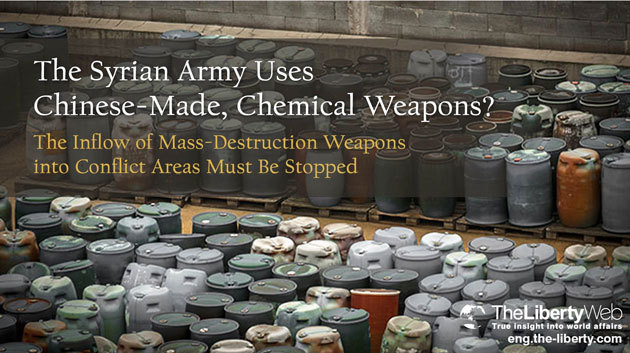The Syrian Army Uses Chinese-Made, Chemical Weapons?
The Inflow of Mass-Destruction Weapons into Conflict Areas Must Be Stopped
At the Republican debate held on November 10th, Mr. Ben Carson, one of the Republican presidential candidates, made a remark to the effect that China as well as Russia has gotten involved militarily in the Syrian conflict.
After the debate, his opposing candidates and experts criticized him for lacking expertise in diplomacy, saying, “We have not seen any evidence of Chinese military involvement in Syria.”
Mr. Carson refuted their claim, saying, “There is no evidence that China is deploying troops to Syria. But China is providing various weapons to Syria.”
Who Supplies Weapons to the Syrian Army?
Can Mr. Carson’s assertion be true? The Syrian Civil War started in 2011. According to data Stockholm International Peace Research Institute (SIPRI) released in 2013, from 2006 to 2010, the five largest arm exporters to the Syrian regime were Russia (48%), Iran (21%), Republic of Belarus (20%), North Korea (9%), and China (2%). China accounted for only a small percentage.
However, a nonprofit, nongovernmental, human rights organization, Human Rights Watch, reported in 2014 that the canisters of chlorine gas the Syrian regime had used to attack its people bore the logo of China North Industries Corporation (Norinco), China’s biggest arms manufacturer.
The Assad regime has been using “chlorine bombs”, barrel-shaped bombs filled with chlorine. The use of industrial chlorine as a weapon violates the Chemical Weapons Convention.
The International Institute for Counter-Terrorism (ICT), an independent think tank in Israel, reported that 10,000 chlorine gas cylinders were transported to Syria via Iran. Norinco denied the allegation that it had exported chlorine gas to Syria, but it did not mention the possibility that Iran had ordered chlorine gas from China and had supplied it to Syria.
The Influx of Weapons to Conflict Areas Must Be Monitored
Assad’s use of chemical weapons came under fire from the international community. After that, the countries concerned agreed to urge Syria to eliminate its stockpiles of chemical weapons. However, the agreement only called for the elimination of sarin and VX nerve agent, an extremely toxic substance, and did not include chlorine gas.
European countries, the U.S., and Russia have also been selling large quantities of weapons to countries in the Middle East, and particular attention should be given to the proliferation of chemical and biological weapons. If China is selling chemical weapons to Syria for lucrative ends, allowing the Assad regime to kill its people, it would deserve criticism.
We must never provide what is regarded as weapons of mass destruction, including chemical weapons, to areas that are disturbed by internal troubles. The international community as well as China should monitor and control their weapons to prevent them from flowing into troubled areas.



















